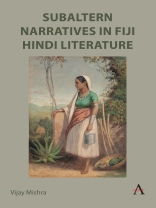Subaltern Narratives in Fiji Hindi Literature is the first study of fiction written in Fiji Hindi. Its target texts are two extraordinary novels Ḍaukā Purān [‘A Subaltern Tale’] (2001) and Fiji Maa [‘Mother of a Thousand’] (2018) by the Fiji Indian writer Subramani. They are massive novels (respectively 500 and 1, 000 pages long) written in the devanāgarī (Sanskrit) script. They are examples of subaltern writing that do not exist, as a legitimation of the subaltern voice, anywhere else in the world. The novels constitute the silent underside of world literature, whose foundational form – the picaresque – it adapts and interrogates. For postcolonial, diaspora and subaltern scholars, they are defining (indeed definitive) texts without which their theories remain incomplete. Theories require mastery of primary texts and these subaltern novels, ‘heroic’ compositions as they are in the vernacular, offer a challenge to the theorist.
The argument of the book takes off from Gayatri Chakravorty Spivak’s well-known declaration (later modified) that ‘The subaltern cannot speak’. Through a close examination of the two novels – and with extensive translations of passages transliterated in the roman script – it is argued that the subaltern does speak but in her own language. The subaltern speech acts in the Fiji Hindi demotic (itself an amalgam of Hindi dialects with borrowings from English and Fijian) are both private and public: private in the sense that the language (which is not to be confused with Creole English or Patois French) is an outcome of a specific historically conditioned Fiji Indian plantation experience, and public in the sense that it can be read and understood by speakers and readers of standard Hindi.
Combining deep sensitivity to language and art, the book makes a very bold claim: these books are world literary texts to which the same kind of exhaustive criticism may be applied that one would with any other great work of literature. This book brings to the reader something that has never been done before. It challenges the subaltern theorist by stipulating (axiomatically) that to understand the subaltern, one must understand her own language and not depend on redacted accounts of their experiences in metropolitan or privileged languages be they French and English or Hindi and Arabic.
Inhaltsverzeichnis
Acknowledgements; A Note on Transliteration; Map of Fiji; Foreword On the Genesis of Ḍaukā Purān; Introduction Reading the Fiji Hindi Demotic; Chapter One The Shock of the New; Chapter Two The Moment of Ḍaukā Purān; Chapter Three Fījī Māṁ: the Female Subaltern Epic; Conclusion Can the Subaltern Speak? Language itself speaks; Appendix; Select Bibliography; Index
Über den Autor
Vijay Mishra is an emeritus professor of English and Comparative Literature at Murdoch University, Australia. His most recent work is V S Naipaul and World Literature. [Assuming it is published by March 2024]












